In this NewsFlash, we boot up computers at the smallest and the largest scales. We'll find out how the newly upgraded HECToR (High End Computing Terascale Resource) helps science & research, and why the new, pocket size & wallet friendly Raspberry Pi should inspire a new generation of computer programmers...
In this episode
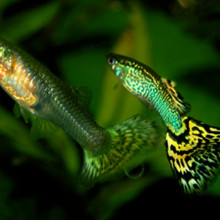
00:16 - Guppies as good at counting as undergraduates
Guppies as good at counting as undergraduates
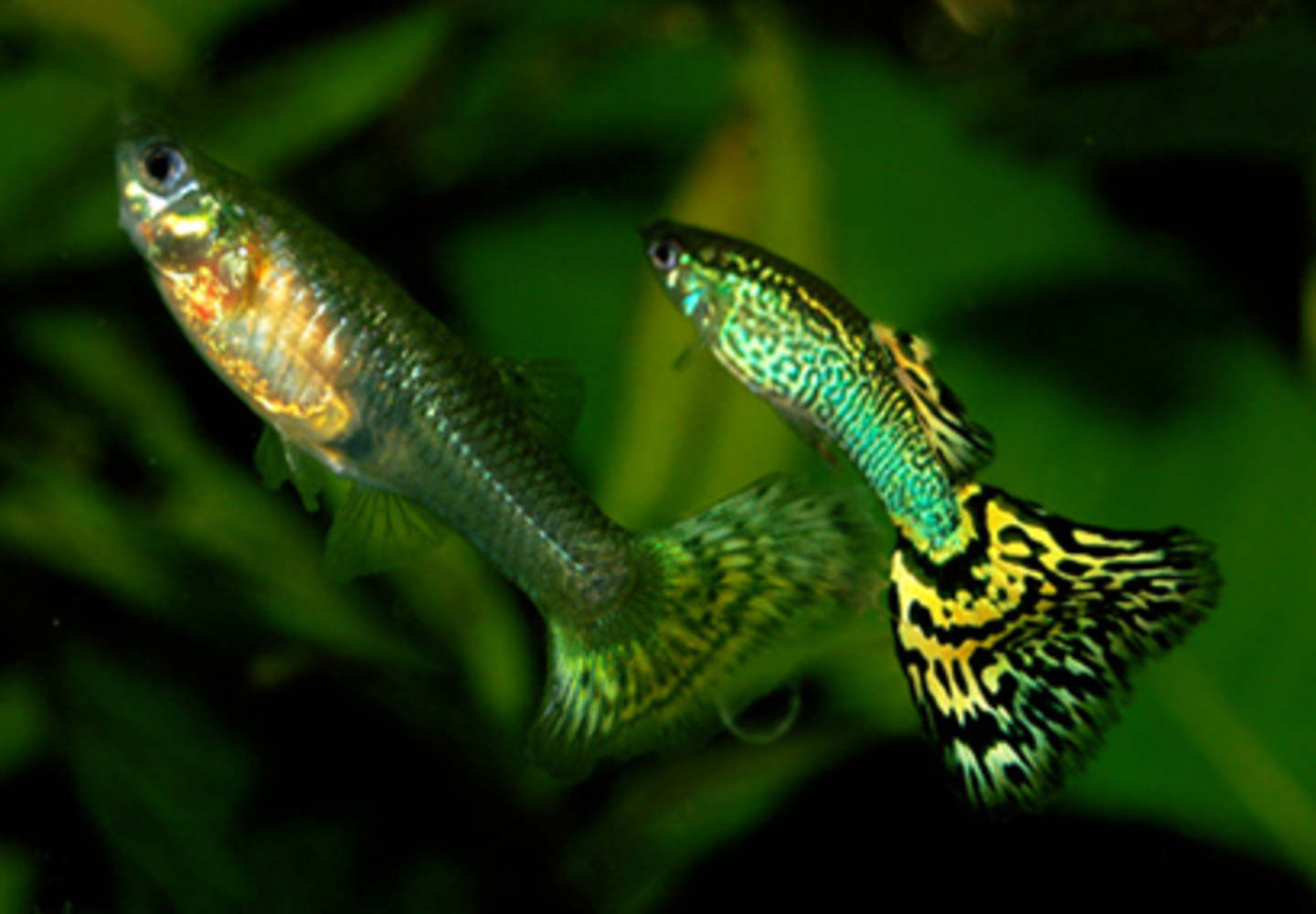 A new study reveals that undergraduates and fish have a lot in common - at least when it comes to counting.
A new study reveals that undergraduates and fish have a lot in common - at least when it comes to counting.
The old wives tale that fish have a seven second memory has been well and truly blown out of the water, with findings emerging that fish in fact have all sorts of elaborate behaviour; they can recognise, copy and deceive each other, and it turns out they can count.
Christian Agrillo of the University of Padova in Italy led a team of researchers who put the counting skills of guppies and human students to the test by asking them to pick the larger of two groups of things.
The undergraduates were shown a cluster of between 1 and 24 dots on a screen. One group of dots were flashed up for 150 ms followed by a second group for the same length of time but of a different number. The students were asked, without counting out loud, to choose which of the two groups had more dots.
The fish were tested by being offered a choice of who to hang out with - it's already known that guppies are quite sociable creatures and if they have the choice they prefer to join a larger shoal. The experimental fish were put in a glass tank resembling a miniature soccer pitch, with two shoals visible in each goal at opposite ends. The research team then watched them for 15 minutes to see which shoal they spent more time close to.
It turned out that both fish and college students performed almost identically in their tasks. They were both better at correctly picking the larger group of dots or fish when the ratio between the numbers was high e.g. they found it easier to distinguish between 24 and 4, than 24 and 20.
This only mattered up to the number four - below that, the ratio between the two numbers made no difference on their ability to pick out the larger group. Discriminating 3 from 4 was as easy as discriminating 1 from 4.
The fact that humans can do this should come as no great surprise - other primates have shown similar abilities. But the finding that guppies do it too is certainly intriguing, especially if you consider that primate brains tend to be around a thousand times bigger than their fishy counterparts. Being able to distinguish different sized shoals could clearly have an advantage for fish, but the study raises various questions about how these counting skills originated and whether it's independently evolved several times.
But as the authors suggest in their paper published in the journal PLoS One, these findings might hint that no matter how bad you think you might be at maths, our modern ability to do sums and count could have evolutionary origins way back among the ancestors us primates share with fish.
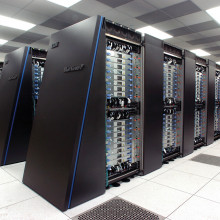
03:42 - HECToR - The next stage of super computing
HECToR - The next stage of super computing
Professor Arthur Trew, Edinburgh Parallel Computing Centre; Dr Carole Morrison, University of Edinburgh
Chris - This week, one of the world's fastest computers just got 10 times more powerful. It's called HECToR - Edinburgh University's building size supercomputer - and it now has over 90 terabytes of memory and it can do 800 million million calculations every second. It's intended to help UK and European researchers to solve some serious scientific problems including things like forecasting the impact of climate change in the future, and predicting the spread of epidemics, and maybe even developing new drugs. Our reporter James Harrison has been to Edinburgh to meet HECToR for himself.
James - The noise you can hear in the background is coming from the cooling system for a computer so powerful that each one of these 30 or so cabinets in front of me consumes the same amount of power as 80 one bar electric fires. This High End Computing Terra Scale Resource, or HECToR for short, represents about 12,000 desktop systems and the calculations they're capable of performing will keep UK research at the forefront in such diverse areas as engineering, medicine, climate change, and environmental protection. Professor Arthur Trew is Director of the Edinburgh Parallel Computing Centre...
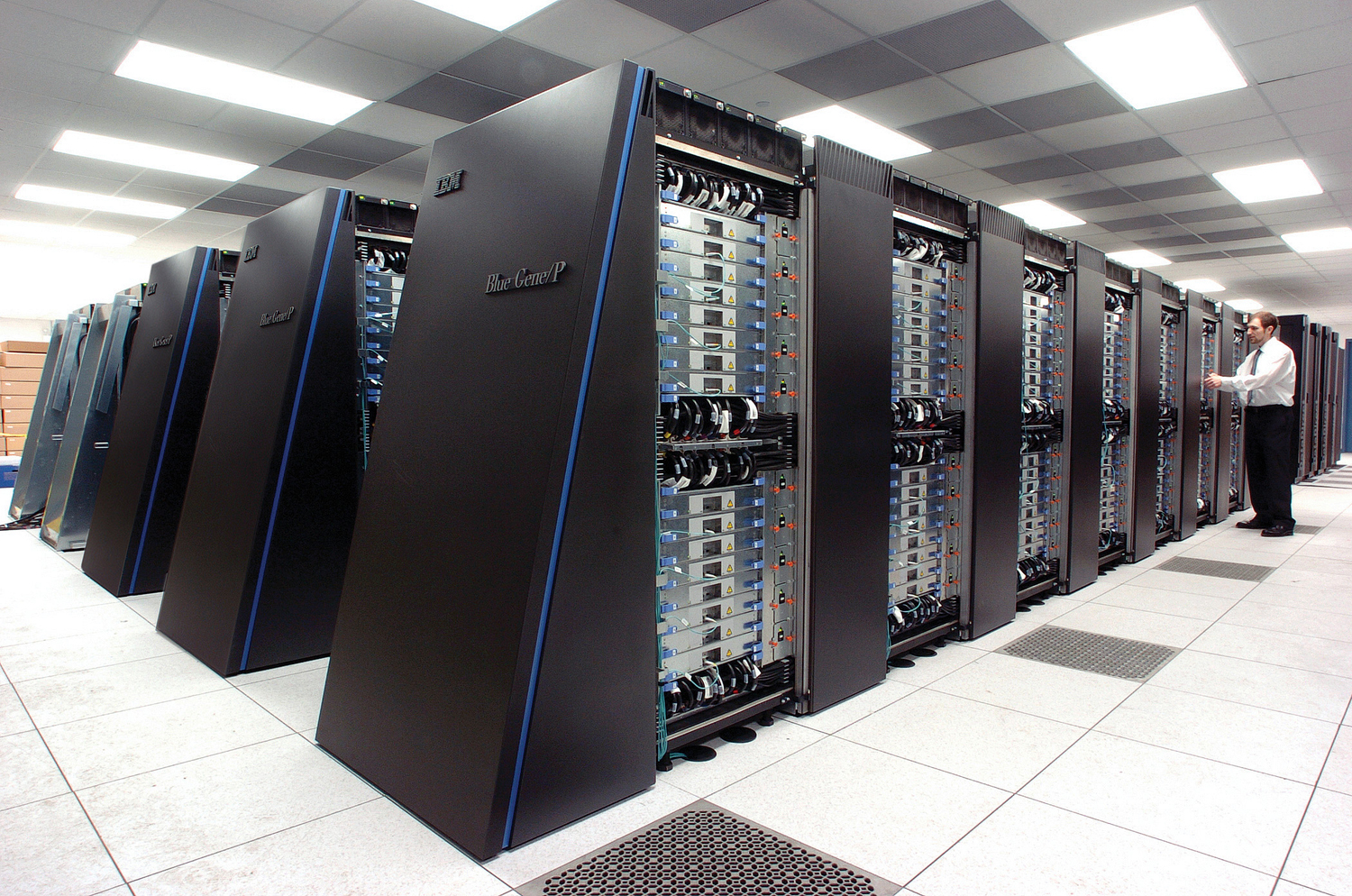 Arthur - Well this supercomputer is capable of doing some 800 million million calculations per second. An easier way to think of it is maybe to say that it's 100,000 calculations per second for every man, woman and child on the planet. HECToR also has an enormous amount of memory. It stores the data on disk just like in your laptop except it's got a petabyte of disk space. That's 1,000 million million million million bytes worth of disk. If you have this much in your iPod and you stored music on it, and started listening today, you'd finish in the year 3153.
Arthur - Well this supercomputer is capable of doing some 800 million million calculations per second. An easier way to think of it is maybe to say that it's 100,000 calculations per second for every man, woman and child on the planet. HECToR also has an enormous amount of memory. It stores the data on disk just like in your laptop except it's got a petabyte of disk space. That's 1,000 million million million million bytes worth of disk. If you have this much in your iPod and you stored music on it, and started listening today, you'd finish in the year 3153.
James - Until more recently, scientists spent much of their time testing theories and ideas by experimentation. But now, with the availability of such facilities as HECToR, adding the power of supercomputing has moved science to another level altogether.
Arthur - The climate is an obvious example of this. You don't want to experiment on the world and the theory is just too complicated. You can't sit down with a pencil and paper. So what we do with a computer is we take those equations that we know and we solve them using the computer to do what the scientist with the pencil cannot. That is to dissect the world, if you like, so that we solve the climate or the weather for a little bit of Edinburgh, a little bit of London, and you stitch them all together to produce a picture of the entire globe and then run that forward for the next 100 years and try to get deeper understanding. It's a complimentary approach to doing science. There are some 50 different research groups from around the UK that are using the facility. They span the range from biology and drug design through engineering, chemistry, and all the way to the environment.
James - The running of HECToR is managed by the Engineering and Physical Sciences Research Council on behalf of Research Councils UK. Being able to predict the effects of global climate change or the way bones are formed were once considered impossible tasks, but now, supercomputing is helping scientists in the UK and around the world work toward solutions. Dr. Carole Morrison is a senior lecturer in chemistry at the University of Edinburgh.
Carole - So an example of where the work we're doing fits in with medical science is in looking at the disease pathways of things like Parkinson's and diabetes for instance. Both of these diseases, the mechanisms of the disease at the atomic level, depend on knowing what hydrogen atoms are doing, the protons. So, these are responsible for dictating the pH of your cells, for instance, because you can transfer hydrogen ions in and out of chemical cells and they're also involved with energy transfer, and so on. If you can understand how hydrogen ions can get in and out of cells, then it will allow you to be able to say something sensible about the reaction mechanisms of these diseases. That then opens up the possibility of being able to design new drugs and so on that might help in the cure of these diseases.
James - But just as with our own personal computers, this technology isn't standing still.
Arthur - We're just about to move on to phase 3 of HECToR which is going to be roughly 10 times the performance of HECToR when it started. This opens up a whole series of new problems that we can start to deal with.
James - And for Carole Morrison, while HECToR's current processing power has already produced important answers in the study of molecular interaction, the next phase of HECToR promises to build on those results, allowing future scientists to produce models that will get even closer to solving the world's biggest disease related issues.
Carole - Phase 3 HECToR will allow us to be able to expand on our model. We want to adapt it. We want to modify it to make it even more realistic. You write up your work, it appears in a journal, you publish it and who knows, maybe somebody somewhere will read it and it will be that piece of the puzzle, that clue, that they need to be able to take our understanding of diseases like Parkinson's, like diabetes to the next level.
Helen - Dr. Carole Morrison at the University of Edinburgh ending that report on the next stage of the development of the HECToR supercomputer launched this week by science minister David Willetts.
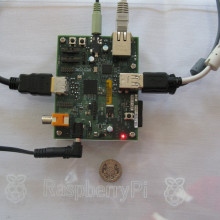
09:23 - Launching Raspberry Pi
Launching Raspberry Pi
David Braben, Raspberry Pi
Chris - Raspberry Pi is the size of a credit card. It will sell for about 20 quid and it would turn your TV into a home computer, and the first units are set to arrive in Britain this week. With us is the co-inventor David Braben from Frontier Developments in Cambridge.
David - Hello.
Chris - So tell us. What was your vision for this when you first thought about creating this incredible miniature computer?
David - What we're trying to do is to bring computers to a lot of people who currently have access to computers maybe at school but don't have access to programming them in the same way. In an awful lot of computers these days, it's very hard to actually get at them as a device for programming. They are very much more devices for consuming software. One of the problems is that a lot of kids at school are put off using computers because ICT is very much how to use office skills and that sort of thing. So they presume that's what programming is all about; which it isn't, programme is exciting, it's fun! You can do science, you can create things, it's really good. But at the moment, with computers, it's very, very easy to muck them up and by that, I mean to stop them working because you've brought in a virus, that sort of thing. The point about Raspberry Pi is essentially, we think it's one of the first stateless computers for a very long time, in fact, since the days of things like the BBC micro, nearly 30 years. The point with that, apart from the Mac Address, when you first switch it on, they're all just the same. If you remove the SD card, there's no state in it.
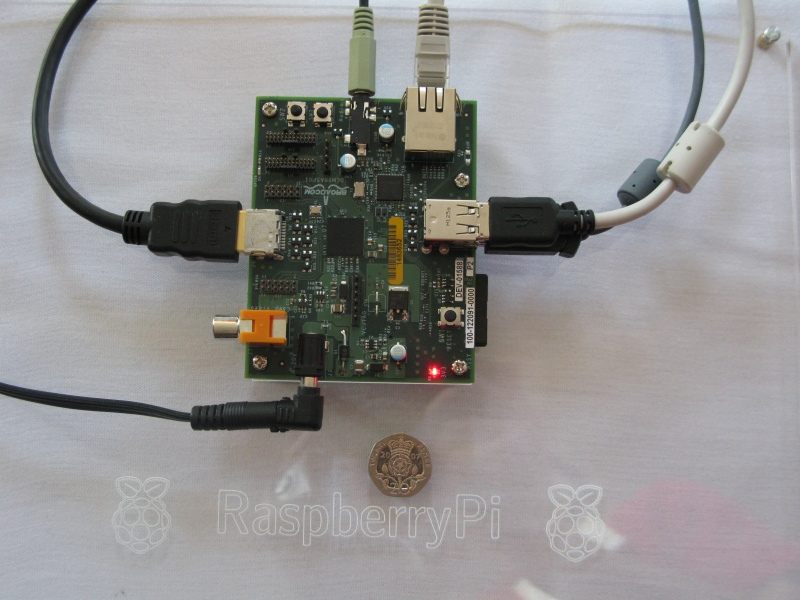 Chris - How does this actually work? How have you managed to get this so small?
Chris - How does this actually work? How have you managed to get this so small?
David - One of the great things with the electronics industry over the last few decades is that electronics have been shrunk and shrunk, and shrunk, using less and less power, particularly for the mobile phone business. So we've really piggy backed off that. The chip that's at the centre of Raspberry Pi is a chip made by a company called Broadcom here in Cambridge, or designed here anyway, which has an ARM chip in it, also from Cambridge, that is small, low-powered, and also, not very expensive.
Chris - And when someone buys one of these things, and 20 pounds sounds like an incredible price point for what you'll be able to do, they'll plug this into their television. How do they then interface with it, keyboards, mouse, and so on? How does that work?
David - Yes, you can plug in. It's got USB sockets in it so you can plug in a keyboard, you can plug in a mouse and there you go, you've actually got a full computer. You can do email and things like that, whatever you would do on a normal PC, but you can power cycle it very, very quickly. We've taken a slightly different philosophy where, yes, bad software might come in, you might do something wrong, you might mess it up temporarily but you press reset and less than 10 seconds later, you're back up again running with a fresh version of the machine.
Chris - You were brought up the BBC Micro computer and that's where you made a huge name for yourself with a game. I know there are people in this room well including me who will have played Elite which you pioneered, and we're still totally amazed that you managed to do with 32K, what you did in that game. It took people a long time to catch up. What language will this run? The BBC computer was so amazing at its time because BASIC, the language it ran was so accessible. It was so easy to learn and it got you into it. What will you do with this?
David - Well actually, two of us wrote Elite, the original, back in '84. What we do with this is we want the first versions, that ones that are going out this week, to be developer versions so we're providing lots of different ways of using it. What we plan is that later there'll be a version that will be a lot more kid friendly. There are several approaches, and what we want to do in the meantime is work out which is best. And one of them interestingly is actually BASIC, the original BBC BASIC, because to be honest, learning is what's important and actually, it's a really good system to learn with.
Chris - So you'll be able to get it to run BBC BASIC. This should get legions of kids programming. Is this who you're aiming this at and we're going to try and get school kids countrywide - just Britain or worldwide - to plug in on this because it's so cheap and it's something they can play without really messing it up.
David - Our initial aim was just Britain but I think worldwide is very hopeful. We've been approached by charities and all sorts of other people. The aim isn't just programming. It's doing creative things with a computer and really to break down the barrier, using the computer as a tool which is something we saw a little bit of excitement for in the 1980s, but that's sort of gone away. They're seen as really dull things and what's amazing is if you talk about it to a kid, you say "would you like to make an app?" then they go, "that's what you mean! That's sounds a lot more interesting." I think that's the distinction.
Chris - The first units arrive tomorrow in Britain, we hope. What will you do with them? How will you scale the project up to then optimise it and then start marketing it?
David - We're hoping, assuming they all work fine, to be actually sending them out this week. We have a plan for increasing the scale of what we're delivering over the next few weeks and months. We think it's very, very exciting. We have a good feel that the demand is high. We don't actually know how high it so it's actually very exciting on that side as well.
Chris - I know you said it's a foundation but is it actually a business as well. Is there an aim to try to make money so that you can re-invest that in the development of this thing or make a profit? What's the model?
David - We are a charity, but that doesn't mean we can't make a little bit of money on each unit. It's a very small amount and we will be ploughing that back in to make the thing better, to produce what we can, and also to support it because the other part of this is to support an online resource so that children, teachers, parents can upload things and download things to make it become a of self-supporting community which I think could be really exciting.
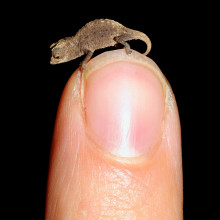
15:08 - Virus detection, fighting parasites with alcohol, drugs on a chip and tiny chameleons!
Virus detection, fighting parasites with alcohol, drugs on a chip and tiny chameleons!
Paul Milner, University of Leeds; Tood Schlenke, Emory University; Michael Cima, MIT; Frank Glaw, Zoologische Staatssammlung Frank Glaw, Zoologische Staat
The Fast way to detect Viruses
A fast, non-invasive, test for virus infections has been developed by
scientists at the University of Leeds.
Current testing methods involve identifying the genetic material of a virus in samples in the lab. But now, working with adenoviruses, Paul Milner has developed a biosensor formed from antibodies and electrodes that reveal not only the presence of a virus as but also the number of virus particles present directly from a patient's sample.
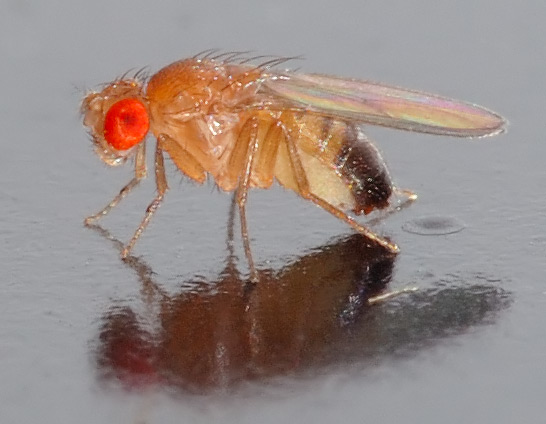 Paul - The antibody binds the virus, this changes the surface of the electrode and it changes various properties of the electrical current that passes across that electrode. The key point about this is there's no processing. It's literally put the sensor into your sample, that's your measurement! This is about speed and ease of use. So you could easily do these tests in a doctor's surgery or for some conditions even at home if it was something you have to monitor frequently.
Paul - The antibody binds the virus, this changes the surface of the electrode and it changes various properties of the electrical current that passes across that electrode. The key point about this is there's no processing. It's literally put the sensor into your sample, that's your measurement! This is about speed and ease of use. So you could easily do these tests in a doctor's surgery or for some conditions even at home if it was something you have to monitor frequently.
Fruit Flies resort to Alcohol
Fruit flies use alcohol to self-medicate against parasitic infections.
Larvae of the common fruit fly Drosophila Melanogaster feed on microorganisms found on rotting fruit, exposing them regularly to a high intake of alcohol.
The larvae are also vulnerable to infection with parasitic wasps which eat the flies from the inside out and cause death.
But now, infecting fruit flies in the lab and exposing them to food containing alcohol, Todd Schlenke from Emory University found that flies infected with wasps purposely consume high doses of alcohol which poisons and kills the parasite.
Todd - Infected flies chose alcohol food at about an 80% rate whereas uninfected flies chose the alcohol food only at about a 30% rate. So flies that are infected, they realise they're infected and they seek out alcohol to try to cure their infections. These animals out in nature have really, really complex behaviours that can help them fight off infectious disease. We probably unknowingly have similar kinds of behaviour. Alcohol might actually act as a protective toxin against infectious disease and something that should probably be followed up in other organisms.
Drugs on a Chip
Microchips have been used to
deliver drugs in patients with osteoporosis.
Ensuring patients take their drugs on schedule and at regular intervals can be a challenge when treating many medical conditions. Robert Langer and colleagues from the Massachusetts Institute of Technology, have overcome this with the design of a chip, implanted under the skin and activated wirelessly, to deliver doses of a drug into the bloodstream at precise times.
Clinical trials delivered a parathyroid hormone, used to improve bone density, in 7 female volunteers with osteoporosis but the technology has the potential for a range of applications.
Michael - This is the first time that implanted electronics have been used to deliver drugs. There are many applications for potent drugs that require subcutaneous injections - MS, diabetes, reproductive health, human growth hormone treatments - so there are many diseases that are treated with very potent drugs like the ones we're able to deliver with this device.
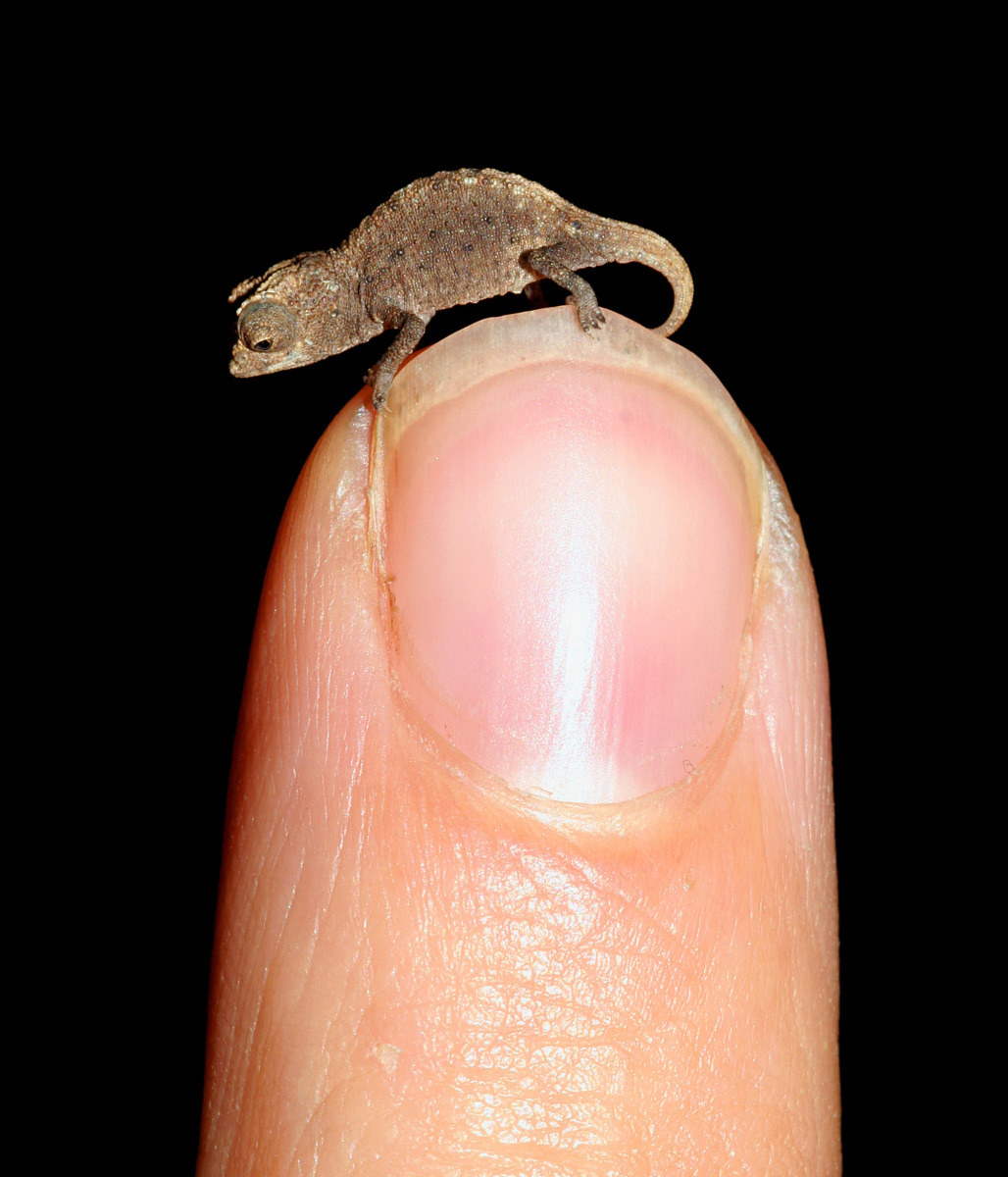 World's Smallest Chameleon
World's Smallest Chameleon
And finally, Some of the world's smallest chameleons have been discovered on the island of Madagascar by researchers from the Zoologische Staatssammlung in Munich.
Four new species were identified by Dr Frank Glaw as they moved from their daytime dwellings of leaf litter and climbed onto branches or leaves to rest at dusk. The smallest of the group, Brookesia micra is one of the smallest reptiles known and reaches a maximum of just 29mm in length.
Frank - It seems that miniaturisation of animals on small islands gives them a new ecological niche. The competition for example of invertebrates, of spiders, or minor invertebrates are not existing in these islands. And so, these animals can evolve into this particular niche that might otherwise on the mainland be occupied by larger animals.
The finding was published this week in the journal
PLoS One.
Related Content
- Previous Goldfinger versus Goldmember?
- Next ZAP! Lasers on trial...










Comments
Add a comment